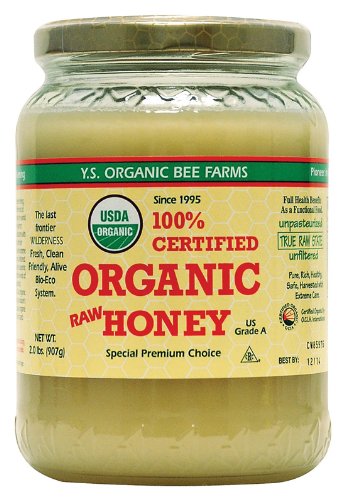Regardless of the source, ‘sweet’ triggers a reward response in the brain that makes us feel good – similar to the pleasurable experience from a drug.
“Sweet sensations evoked by sugar-sweetened foods and drinks are probably one of the most precocious, frequent and intense sensory pleasures of modern humans.” Lenoir et al, PLoS One, 2007
Part of this sweetness enjoyment can be traced back to our days as hunter gatherers, when sweet meant we found honey. And other than the delicious taste, it signaled to our brain that we found lots of nutrients and calories.
In fact, some hunter-gatherer tribes relied very heavily on honey (1, 2), consuming more than 20% of their total calories from it during certain seasons.

Which DOESN’T mean you should, but it’s worth mentioning – as it’s an important point to consider when evaluating whether or not artificial sweeteners make sense.
The other important consideration, and one that we discuss in Live IT NOT Diet!, is that honey was damn hard to access. Compared to today, where we can access copious amounts of sweet whenever we please.
In 2012 the average consumption of sugar and sweeteners per person per day was 24.7 teaspoons, and accounted for 16% of total calories (in ALL seasons!).
Surprisingly, this 2012 figure is not much greater than 1970 (24.7 vs 23.7 and 16% vs 13%), as one would expect. Although, the majority of that increase (80%+) came via sweetened beverages, and NOT solid food. Meaning, none of the extra calories and nutrients the hunter gatherers experienced with sweet. And thus, none of the satiation that’s supposed to come with it (1, 2).
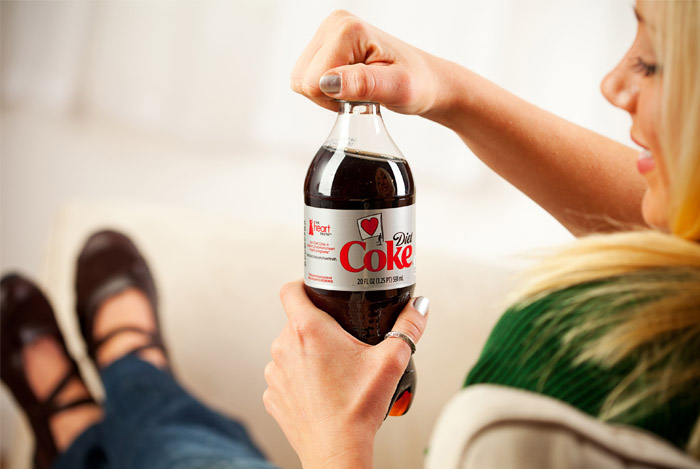
This is the major problem with sweeteners, and specifically the low or no-calorie varieties.
They give our brain and body all the pleasure it’s come to love, with no registration of nutrients and calories.
So, before even discussing blood sugar and insulin, we’re working with endless amounts of pure deliciousness, that we don’t have to work for, and doesn’t count as food.
For instance, it’s been demonstrated in rats that artificial sweeteners may somewhat impair our ability to regulate food intake – as those fed sweeteners consistently gain more weight than their sucrose and glucose eating counterparts.
And what worse, is that this impairment seems to continue even after the rats are switched back to regular glucose or sucrose.
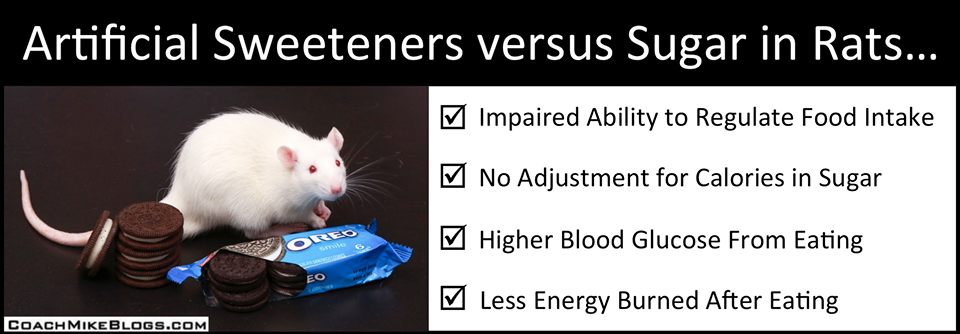
The other thing that’s odd, is that artificial-sweetener fed rats seem to lose their ability to adjust for the calories in sugar. Eating far more food after a pre-meal sugar hit than their sugar-fed friends, who seem to adjust for the calories in sugar and eat far less food afterwards (like they’re supposed to).
“…the ability of rat pups to regulate their caloric intake after consuming a novel high-calorie, sweet food was disrupted if they had received prior training with sweet tastes that failed to predict the caloric consequences of eating.”
Although the weirdest thing that happens with rats fed artificial sweeteners is that they don’t experience as much of a boost in their metabolic rate (thermic effect) and exhibit higher blood glucose levels when given the same meal!
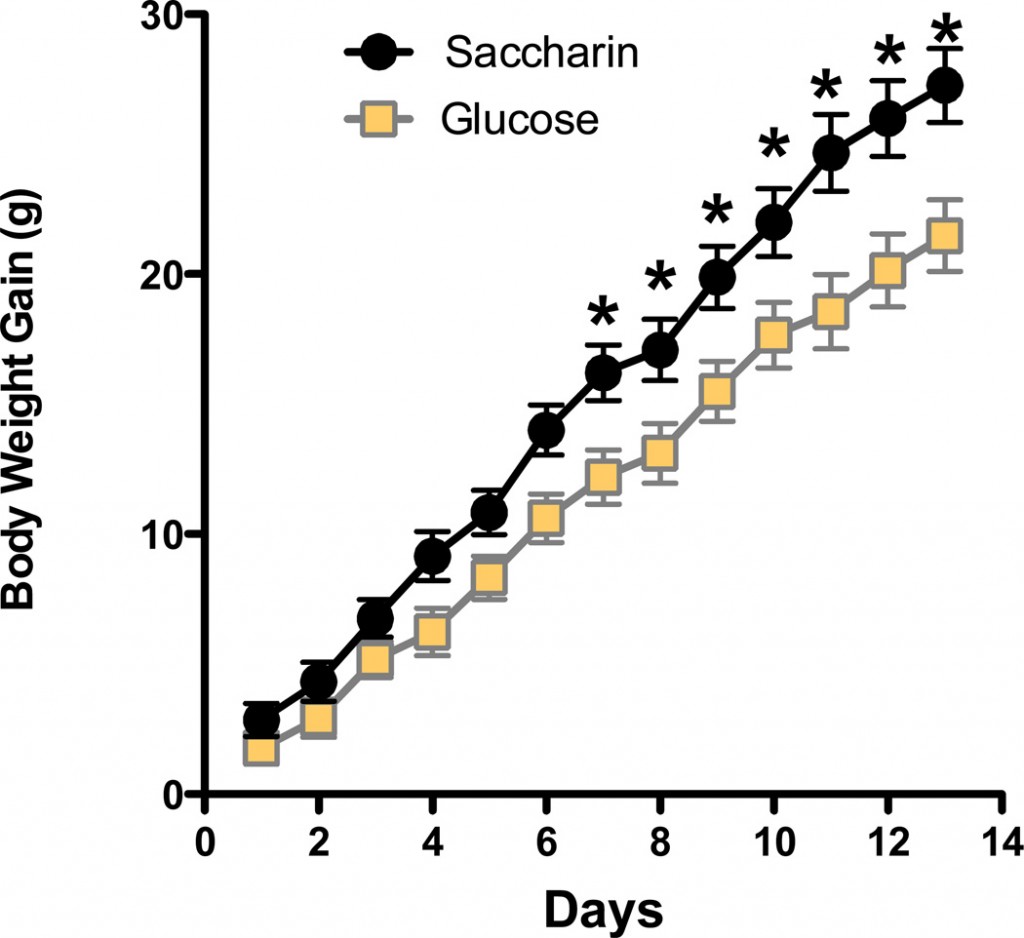
And yes, this is rat research, so there’s always the chance that things could be different for humans. BUT, it sure would explain a lot when it comes to the obesity epidemic:
- less satisfied from meals
- no reduction in food intake after sugar calories
- higher blood glucose levels
- slower metabolic rate
Two studies we do have on humans show that those conditioned with artificial sweeteners regularly have a far more drastic brain response to sweetness in general (1, 2). Meaning they love how it feels more than the next guy; which probably means they crave and consume it more than the next guy – regardless of where the ‘sweet’ is coming from.
Can you say addicted?

The question that usually comes next is:
“What about ‘natural’ sweeteners?”
To which I usually respond:
“What are you naturally sweetening?”
Because natural sweeteners, like stevia, have produced positive results with respect to blood glucose and insulin, and our body does seem to register the calories consumed with no overcompensation later, but that’s in studies where it’s compared to sucrose and artificial sweeteners!
So sure, Stevia is better than other sweeteners. But “not sweetening” is still better than Stevia.
And it’s a similar story with the sugar alcohols (xylitol, sorbitol and erythritol) – as technically they’re naturally occurring from fruit. And since we can’t totally digest and absorb them, we don’t really see a major impact on glucose or insulin (with some studies showing improvements – 1, 2, 3). BUT, this simply means the biomarkers are better than sucrose-sweetened beverages. Meaning, it may improve your health if your baseline of health is crappy, but you’re not going to see improvements by ‘adding’ to your diet that doesn’t contain any sweeteners in the first place.
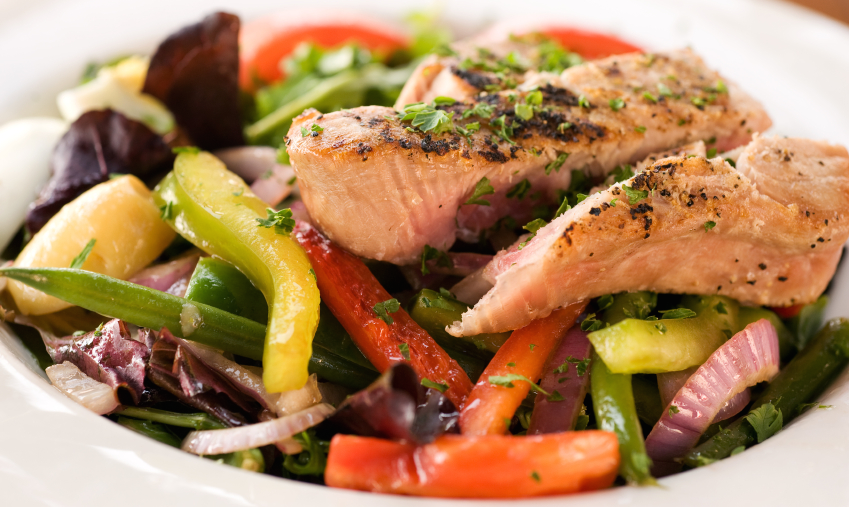
Realistically, if you’re going to sweeten something (maybe because you just exercised), your best coming as close to real food as possible; with something like honey. Because unlike these “better-than-sucrose extracts,” it actually has some health benefits on it’s own.
- increasing antioxidant levels (1, 2)
- lowering inflammation (1)
- reducing LDL cholesterol, c-reactive protein and triglycerides (for individuals with disrupted levels) (1)
- lowering blood glucose (1)
- reducing infections and bacterial overgrowth in the gut (1, 2)
This doesn’t mean you need to start adding it to your coffee, and purposely consuming spoonfuls throughout the day. But if it’s time to sweeten (because you earned it), clearly honey is your best bet.
…just make sure it’s the REAL stuff (1, 2, 3)
Stay Lean!
Coach Mike
P.S. Xylitol (the sugar alcohol) appears to be really good for your teeth. And thus, one could make a case for buying a xylitol sweetened toothpaste, or opting for xylitol sweetened gum. Especially if it means ditching the fluoride and sucrose!
RELATED ARTICLES:
The Truth About Salt & Hypertension
Why Carbs Are Best Consumed AFTER Exercise
High Blood Sugar (Hyperglycemia) AGEs The Body
10 Benefits of Low-Carb You Don't Get With Other Diets
Don't Mess With The Microbes - Gut Bacteria, Obesity, and Disease
